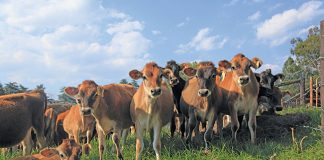The disease is caused by a virus that is transmitted by mosquitoes. Outbreaks usually occur from spring until late summer. South Africa has rain during this time – so it’s important for farmers to look out for the disease. People can contract RVF if they work with sick animals or contaminated meat. Mosquitoes don’t transmit RVF to humans.
Untreated, the disease can result in blindness, or death due to liver damage. Symptoms Death among animals is common. Up to 95% of pregnant animals can abort and death of young lambs and calves can be high. Older animals are more resistant to RVF, and young animals can die quickly without showing any symptoms.Suspect RVF if older animals stop grazing, become weak and get left behind by the flock. There may also be nosebleeds and bloody diarrhoea, while the eyes and skin become yellowish. Goats are more resistant to RVF, and their symptoms are less severe.
Post-mortem signs
Look for blood in various organs, especially the heart, lungs, liver and gall bladder. Blood may also be found in the chest cavity.There will also be liver damage. It may be swollen, or enlarged, with a yellowish-orange colour. Pinhead-sized grey-white specks where cells have died can also be seen.
Prevention
As no treatment exists yet for infected animals, prevention is the only solution. This can be done with vaccine. There are two types of vaccine – live Rift Valley fever vaccine and dead Rift Valley fever vaccine. In sheep and goats, a live RVF vaccine will immunise the animal for life, but it mustn’t be used on pregnant animals, because the ewe and unborn lamb can die. For pregnant sheep, goats and cattle, use the dead RVF vaccine, although it only protects the animal for one year.
RVF and Wesselbron disease
Wesselbron disease often occurs with RVF. The symptoms are very similar and abortions are common, but humans aren’t affected. These diseases are often confused – in fact, the difference can only be determined in a lab. Only a live vaccine is available for Wesselbron disease and it can be used with the live RVF vaccine, except on pregnant animals.Source: Department of agriculture, Western Cape. For more information on RVF and vaccine.
Contact Dr Jacob Modumo of Onderstepoort Biological Products on 012 522 1500 or [email protected].













